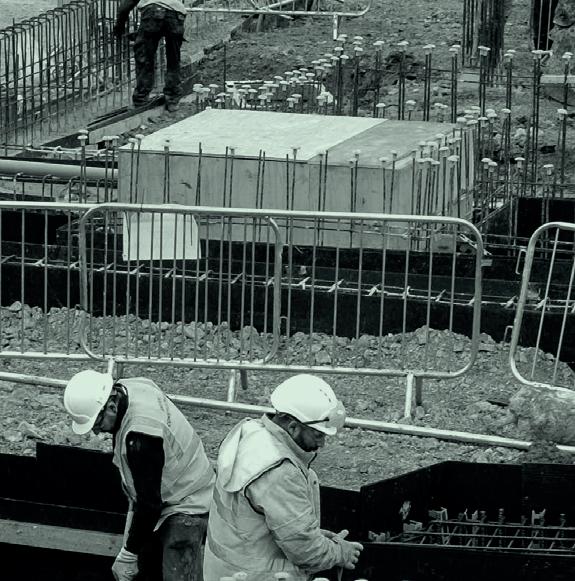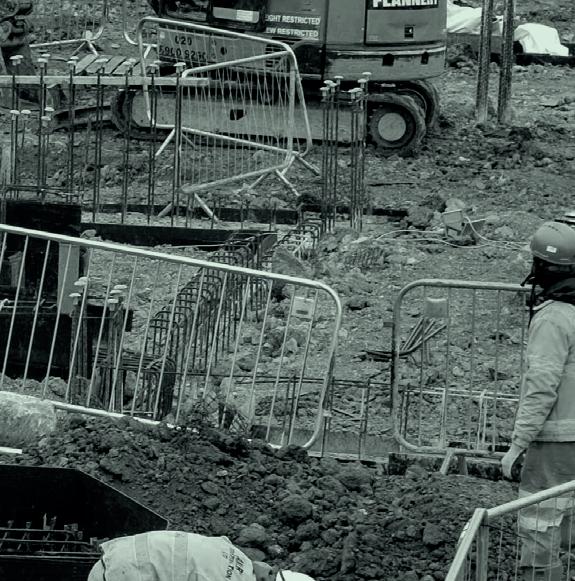
6 minute read
The chain
The pandemic brought to bear supply chain delays of goods and services. It also threw into sharp relief the ethical considerations for employees as part of that supply chain; for example, health and safety practices, safeguarding workers’ rights and human rights. Here are some ways to mitigate supply chain risk in 2021.
Brexit deadlines
Anyone sett led in the UK for more than fi ve years as of exit day (31 January, 2020) is likely to be able to gain sett led status, which will grant them the same rights as British citizens, but they only have until 30 June 2021 to apply.
There are concerns that language barriers and a lack of awareness of the need to apply may prevent some workers from completing the application.
A sudden exodus of staff could compromise health and safety and business continuity, so businesses should ensure everyone in their supply chain is aware of the need to apply for sett led status and off er assistance. The application can be accessed at gov.uk/
sett led-status-eu-citizens-families/
applying-for-sett led-status.
Know your workforce
Checking the identity of workers before allowing them on-site and being confi dent that they are qualifi ed and have the right to work can help prevent illegal working and modern slavery, manage health and safety risks, and ensure supply chain security.
Consider whether your current workforce credential management processes are
Goods supply chain issues in 2020 caused delays and annoyance, but these aren’t the only supply chain risk, says CHAS








comprehensive enough. Are you confi dent of the identity of everyone on your site, their right to work and their competence?
Consider your social impact
Put simply, social impact is the potential for positive or negative eff ects on wider society or individual people. All businesses create social impact through their supply chains, and, in our ever-more connected world, these eff ects can be both local and global and present risks to businesses.
Social impact risks can occur across a range of issues, including: health and safety; human rights and modern slavery; equality, diversity and inclusion of all; while positive impacts can derive from decent employment and training opportunities.
Businesses should assess their business for risks related to these impact areas and ensure that if any negative impacts are found, steps are taken to address these. Some of these areas are covered by active legislation in the UK, including the Equality Act 2010 and the Modern Slavery Act 2015. Assessing and managing risk should be both an aspect of legal compliance for your business and part of being an ethical and responsible business.
IMAGE: © PHILIP WOLMUTH/REPORTDIGITAL.CO.UK
Prepare for IR35 changes
Wikipedia explains: “IR35 refers to the UK’s anti-avoidance tax legislation, designed to tax ‘disguised’ employment at a rate similar to employment. In this context, ‘disguised employees’ means workers who receive payments from a client via an intermediary, for example, their own limited company, and whose relationship with their client is such that, had they been paid directly, they would be employees of the client.”
Delayed IR35 changes, which govern whether an individual working as a contractor or freelancer ought to be deemed an employee on payroll for taxation purposes, are due to go ahead in April 2021. The changes mean that medium and large businesses will be responsible for determining whether IR35 applies and could face fi nancial penalties for noncompliance. Companies that haven’t done so already should audit their current contractor base and determine who falls inside and outside IR35, using the HMRC’s CEST tool: gov.uk/guidance/ check-employment-status-for-tax.
Once businesses have determined where IR35 applies, they should communicate with existing contractors and put processes in place to determine if the off -payroll rules apply to future engagements.
Familiarise yourself with tougher payment rules
From April 2021, contractors bidding for government contracts above £5m per annum will need to be able to pay at least 85% of invoices to their supply chain in 60 days and have an action plan for how they will pay 95% in 60 days. Contractors that fail to meet these requirements may be suspended from winning any further government contracts until their payment performance improves. For more, see bit.ly/GovPayment.
Check that your supply chain is Covid-secure
Covid-19 vaccination developments are good news, but they are not a quick fi x; businesses will need to continue to manage the risk of Covid-19 in 2021. This includes checking that the issue is being taken seriously throughout the supply chain and looking for evidence that contractors are committ ed to Covid-secure practices. Anyone who regularly employs contractors can access the CHAS (Contractors’ Health and Safety Assessment Scheme) database of companies that have completed a Covidsecure Statement of Best Practice for no charge at chas.co.uk/chas-client-portal/.
Refocus on health and safety
Covid-19 has been a signifi cant distraction in 2020, so it can be benefi cial to reinforce expectations around health and safety, particularly if you have diversifi ed your supply chain. It’s crucial to ensure all contractors understand their obligations and have the correct management systems in place. The easiest way to do this is to choose a contractor that has been accredited by a third-party assessor.
Control carbon
Sustainability is rising rapidly up the construction industry’s agenda, with many companies making public commitments to accelerating their journey towards carbon neutrality and asking their supply chains to do the same. It is becoming commonplace for businesses of all sizes to track their carbon use via tools such as CHAS Plant, which monitors all the plant being used on a site and helps meet regulatory obligations like non-road mobile machinery.
Many businesses are also embracing circularity, which involves eliminating waste and fi nding ways to continually use resources. For more on building a circular economy implementation plan, see Circulytics, a free digital measuring tool from the Ellen MacArthur Foundation: bit.ly/EMFCirculytics.
Prevent bribery and corruption
The Bribery Act will be ten years old in June 2021, yet many companies are still unaware of their obligations around the prevention of bribery and corruption. Under the Bribery Act 2010, if you can’t prove that you have adequate procedures in place to combat corruption, you’re guilty of failing to prevent bribery and can face unlimited fi nes. The Ministry of Justice has published six principles for bribery prevention that are a useful focus for organisations of any size. These include: proportionate procedures; top-level commitment; risk assessment; due diligence (including training); and monitoring and review. Read here: bit.ly/BriberyGuidance.
With an increasing number of issues, gett ing a measure of managing every aspect of supply chain risk management in-house can be a daunting task, especially when you are managing multiple contractors, but help is freely available. For example, if you regularly hire contractors, you can become a CHAS Client for absolutely no cost, giving you access to a database of contractors that meet a wide range of assessment criteria. A growing number of these contractors have completed the new Common Assessment Standard, which is fast becoming the gold standard for prequalifi cation in the construction industry.










